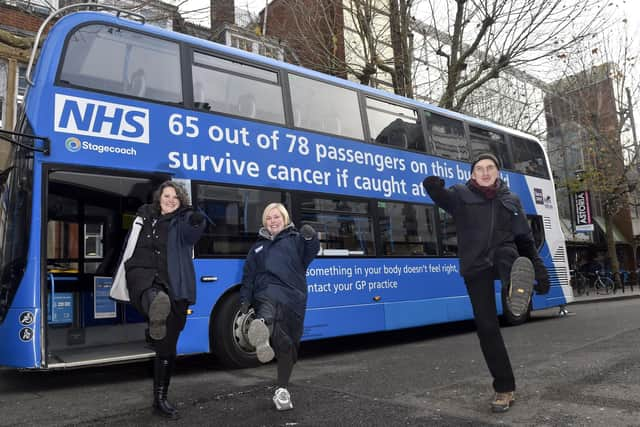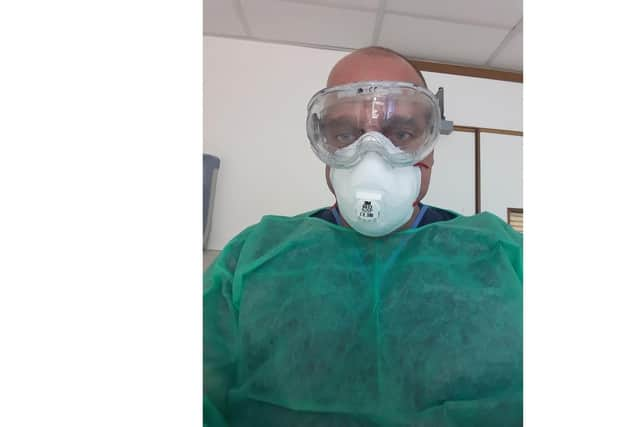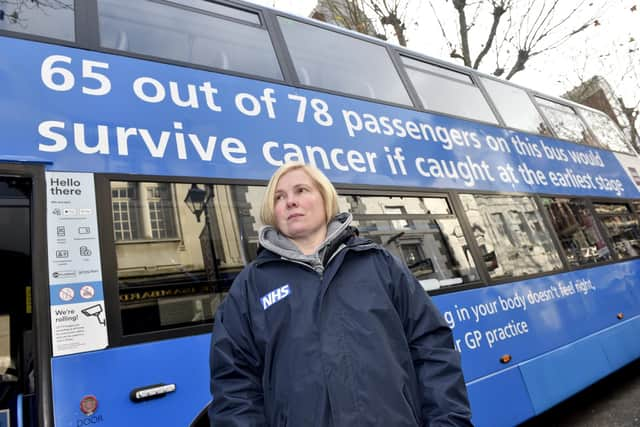NHS Bus-ting Cancer Tour helps spread the importance of early detection as it comes to Portsmouth
and live on Freeview channel 276
However, he managed to rationalise it as poor diet and being on his feet for the 12-and-a-half hour shifts while clad in PPE.
On Christmas Eve, 2020 he had an operation on a lump he had found between his ear and jaw. It was during this process that his anaesthetist noticed John’s iron and haemoglobin levels were extremely low. He contacted John’s GP to refer him for further tests as he couldn’t believe John had been working long days and cycling to work with such low levels.
Advertisement
Hide AdAdvertisement
Hide Ad"Looking back I was knackered all the time,” says the 47-year-old from Portsmouth, ““I had this pain in my right side and my stools weren't right, but I thought that was because I was eating rubbish food. I was eating what I could when I could – snacks and rubbish. Looking back, in hindsight, things weren't right. I was losing weight as well, but I thought was just Covid and working.


“As rehab, we had all the long-Covid patients who'd been through ITU as well. It was quite a tough ward to work on, mentally and physically challenging.”
John is speaking about his experience as part of the NHS Bus-ting Cancer Tour, which has visited Guildhall Square in Portsmouth. The branded bus is travelling the country to help raise awareness of the signs and symptoms of cancer and to encourage people to contact their GP practice if they notice something in their body that doesn’t feel right, because finding cancer early makes it more treatable and can save lives.
After the surgery things moved quickly for John. Test results led to a colonoscopy which revealed a tumour.
Advertisement
Hide AdAdvertisement
Hide Ad“I'm a nurse, and I was looking at the screen, so I knew that was a tumour. It was all quite emotional. That was on a Sunday. On Monday the colorectal nurses phoned me first thing. Then on my birthday, February 24, 2021, I had my CT-PET scan, which is obviously not the way I wanted to spend my birthday.”


“My angels”
He refers to the nurses on the colorectal team as “my angels” for the professional and reassuring way they took him through the process. In March John had keyhole surgery using the ground-breaking Da Vinci robot which removed the tumour and 42 lymph nodes.
“It was all a whirlwind, in a way it's good that it did happen so quickly. The nurses treating me didn't know I was a nurse – I didn't tell them because there was no reason to, they were amazing, but it's not my specialty.”
John opted for six months of oral tablet chemotherapy, as he was determined to resume normal life as soon as possible. As a member of Portsmouth Hockey Club, his team mates were “ridiculously supportive”. And he was soon umpiring games, and then playing in goal for the over-40s quad, who made it to the national finals.


Advertisement
Hide AdAdvertisement
Hide AdHe also credits the charity Macmillan Cancer Support for helping him massively during this period.
“I'm two years down the line now, and have had CT scans every year and colonoscopies every year – touch wood I'm still clear. It takes longer than you think to get over everything.”
With regards to the importance of early detection of cancer, John says: “If something doesn't feel right, just get checked. Get checked and don't be afraid to get checked. And the trust are there to support you – they've been amazing.”
Rachel found a lump
For Rachel Hibbert, a keen gym-goer, in 2017 she noticed a lump on her chest and at first thought it was a pulled muscle.
Advertisement
Hide AdAdvertisement
Hide Ad"After a couple of weeks I noticed that it hadn't really changed, and also that it wasn't painful,” she recalls. “It seemed a bit strange to not be hurting or changing. It was at that point I decided to go and get it checked out and I'm glad I did because it was early enough to be really treatable.”
Rachel was fast-tracked to the breast care service, where they took a biopsy.
"It was then they took me into another room and asked me if I had anyone with me. I brought my fiance in, then they handed me some leaflets and said we're not 100 per cent sure, but we think you've got some sort of cancer.
“I was floored. I was 34 at the time and it hadn't crossed my mind. I was quite blase about it – I thought it was something older people got.
Advertisement
Hide AdAdvertisement
Hide Ad“I'd lost my mum two years earlier quite quickly to lung cancer and all I could think about was that – am I going to die? Am I going to leave my child without a parent?
“It does change your perspective on life when you go through this – facing death. You don't take things for granted quite so much, and you maybe appreciate things a little bit differently.”
Rachel had her left breast removed and the 40-year-old is now six years into a 10-year course of the drug tamoxifen.
Getting cancer spurred Rachel into getting married. “We got married during my treatment because I felt like I didn't know what the future held. We threw it together in a couple of weeks – we got married in the registry office, and the brief was that we wanted people to wear their own clothes, we didn't want presents. The only thing we did have was a wedding cake – then we went for a carvery over at the local pub. And it was the best day!”
Advertisement
Hide AdAdvertisement
Hide AdWhile on the road to recovery, cancer has left her with long-term health conditions, but Rachel remains upbeat.
“It's very up and down. I've got fibromyalgia and chronic fatigue – I can't really predict how I'm going to be. Some days I can't get out of bed, other days I'm relatively okay. I don't get upset about it any more because I'm still here – every day's a blessing. I've lost friends to cancer, so if this is my life at least I'm still here. I try to always be glass half-full!
"The breast care nurses at QA are fantastic, if I ever have any bother I just ring them up and go see them. Hopefully it's just a few more years of these tablets and then I can draw a line under it.
"The key message is for people to be aware of their bodies – if anything is wrong, no matter how small you might think it is, go and see your GP and get it checked out.
Advertisement
Hide AdAdvertisement
Hide Ad“And treatments are evolving all the time. just from when I had it six years ago, I'm involved in a local cancer support group now, and people coming through now have different treatment to what I had. “Cancer's not a death sentence any more – people are quite scared of the word, but don't be frightened of it.”
Five out of six cancers can be cured if caught early
Dr Richard Roope Hampshire and Isle of Wight Primary Care Cancer Lead emphasises the importance of early detection – an area Portsmouth is sadly behind the curve on.
"Across all cancers, there's the statistic that five out of six cancers will be cured if caught early, but that number drops significantly if you present with a late cancer.
"Portsmouth sadly doesn't have a good record for early detection. Portsmouth has a higher incidence of cancer than the country's average. That's partly an issue with deprivation, but there are other contributing factors. We know that those from Asian and Black heritage backgrounds are more reticent to come forward. And there's also the dockyard, for years the guys working there were exposed to asbestos, so it's a hotspot for lung cancer. Asbestos is no longer being used, but from exposure to developing lung cancer can take 30-40, sometimes even 50 years.”
Advertisement
Hide AdAdvertisement
Hide AdWith regards to preventing cancer Dr Roope says: “It's all the things we're fairly familiar with but it's all really important. Smoking is probably the biggest preventable cause of cancer. Although numbers are coming down, there's still some way to go. Across the country about 12.5 per cent of adults are still smoking. It's come down by about a third in 10 years, which is encouraging.
“Weight is an issue – there about 13 different cancers that are more common in those who are overweight or obese. Then we've got the sun for melanoma, and activity, exercise and diet, they can all have a part to play.
“In terms of early diagnosis, it's all about being body aware and sensible and trying to overcome any fear or apprehension or reticence folks have to see their GP. We know it's really difficult to get an appointment because demand is outstripping capacity, but folk need to be really persistent and tenacious and make that contact.
“We know that people are quite well-meaning and they feel they don't want to waste anybody's time, but actually, all the data shows that if you present early with a cancer, it's less consultation with the GP and their team, less consultation in hospital, the treatment is simpler and less complicated, and not the most important factor, but it is still a factor, it costs less to treat an early cancer.
"It's a really important message to get across that if cancer is caught early, it is no longer a death sentence.”